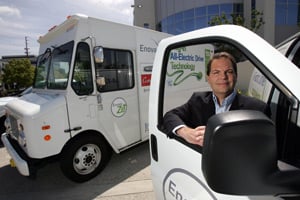For Enova Systems Inc., turning a profit always seems like it’s around the next curve.
The Torrance-based maker of hybrid and electric drive trains for trucks and buses sees itself as well-positioned with contracts with electric-truck manufacturers. It’s just that the contracts haven’t lived up to their potential as truck and bus fleet operators have been slow to convert to electric vehicles.
The result: Enova continues to rack up losses each quarter, with no break-even point in sight. And investors have soured on the company, pushing its stock down to 64 cents a share from a high of $1.40 six months ago.
Enova executives are quick to point out that investors have also driven down the shares of other electric-truck makers in recent months. But they remain optimistic that the market is promising for its electric drive trains, as major delivery fleet operators such as Frito-Lay North America Inc. and United Parcel Service of America Inc. are beginning to place orders.
In fact, Frito-Lay announced last week it was adding two dozen hybrid-electric vehicles to its fleet of 48 hybrids now serving the L.A. area.
Anticipating more such orders, Enova earlier this month filed a shelf offering registration with the Securities and Exchange Commission for up to $50 million worth of additional shares over the next three years.
Enova Chief Executive Michael Staran insists that the shelf offering is to raise capital to fund an expansion of the company’s assembly operations for its electric drive train, not to balance the company’s books.
“We do feel that we need to scale up within the next few months,” Staran said last week.
Enova could certainly use higher sale volumes. Staran said the company needs $25 million a year in revenue to break even. Yet last year’s revenue was only $8.5 million. For the first half of this year, the company reported $5.5 million.
In its latest quarterly filing with the SEC, Enova reported its cumulative losses totaled about $147 million. Chief Financial Officer John Micek said that about $87 million of those losses were accumulated in the 1990s as the company first invested in the market for electric passenger cars then switched to the electric-truck market.
The rest came after 2000. Staran said the rate that the losses are widening has slowed because the company has reduced costs to the point that operating margins have turned positive.
However, for the company to break even, it needs to sell more electric drive trains.
“Whether the orders will come in time is the key question facing Enova right now,” said John Boesel, chief executive of Calstart, a Pasadena-based organization that provides research and development for the alternative-fuel transportation industry.
The short-term outlook is uncertain. Fleet operators put any plans they had to convert to electric vehicles on hold once the recession began. Even now, they are only converting on a pilot program basis: UPS has more than 100,000 delivery vehicles worldwide, yet only 28 of them are electric. Last month, the company announced that it will purchase 100 electric vehicles for use in California from Stockton-based Electric Vehicles International.
That won’t benefit Enova, because it doesn’t have a contract with EVI. But the company does have contracts with two other major makers of electric vehicles: Smith Electric Vehicles, a long-established British company that recently entered the U.S. market – and which has the contract with Frito-Lay – and Freightliner in Gaffey, S.C., the nation’s largest maker of truck chassis and a division of Daimler Trucks North America LLC.
The forecasts of Smith, Freightliner and other electric-truck makers fell short in recent years. Staran said short-term volumes are more promising in China, where Enova is a drive train supplier for truck maker FAW Group Corp. Over the last 18 months, FAW, or First Auto Works, has been Enova’s largest volume customer, ordering more than 400 drive train systems.
But it’s not enough. For Enova to break even, either many more fleet operators have to start placing orders for electric trucks or giant fleet operators like UPS have to start ordering several hundred vehicles at a time.
Shelf registrations have become increasingly popular in the last couple of years, especially with the stock market volatility. Investors may not be happy about the forthcoming share offerings, as the result may be a dilution in the value of their stock.
But John Ahn, president of B. Riley & Co. LLP, a West L.A. investment banking firm, said dilution should not be a major concern for existing shareholders because they will have the option to snap up even more stock.
“If management lays out for the investors a path to break-even, then some of the investors will have the opportunity to double-down on their investment,” Ahn said.

